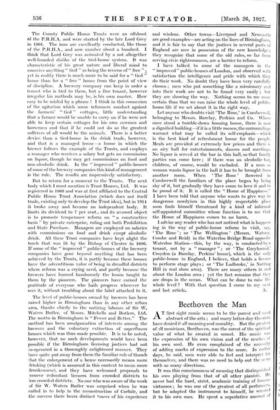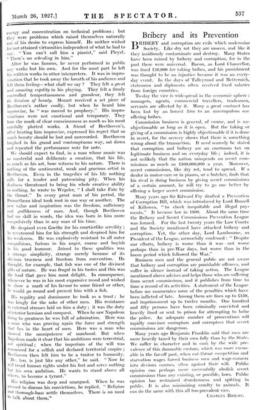Beethoven the Man
AT first sight music seems to be the purest and most abstract of the arts ; and many latter-day theorists have denied it all meaning and morality. But the greatest of all musicians, Beethoven, was the surest of the spiritual value of what he created in sound. His music Avn'; the expression of his own vision and of the reaclie, ol his own soul. He even complained of the -necessity of adding marks of expression to the score. In earlier days, he said, men were able to feel and interpret for themselves, and there was no need to help out the score with so many directions. • - It was this consciousness of meaning that distinguished his own playing from that of all other pianists. Ile never had the hard, strict, academic- training of famous virtuosos ; he was one of the greatest of all performers but he adapted the instrument to himself, he wrested it to his own uses. He spent a superlative -amount of energy and concentration on technical- problems ; but they were problems which raised themselves naturally out of his desire to express himself. He neither wished for nor attained virtuosities independent of what he had to say. " You can't call him a pianist," said Pleyel.
There's no schooling in him."
After he was famous, he never performed in public any works but his own. And for the most part he left his written works to other interpreters. It was in impro- vization that he took away the breath of his audience and left them feeling—what shall we say ? They felt a great and amazing regality in his playing. They felt a firmly controlled tempestuousness and grandeur, they felt the lieroistn of beauty. Mozart received a set piece of Beethoven's rather coolly, but when he heard him improvize, he " was moved to prophecy." His impro- vizations were not emotional and temporary. They bore the mark of clear consciousness as much as his most carefully plotted works. A friend of Beethoven's, after hearing him improvize, expressed his regret that so much beauty should be lost and unrecorded. Beethoven laughed in his grand and 'contemptuous way, sat down and repeated the performance note for note.
We should expect to find, in a man whose music was so masterful and deliberate a creation, that his life, as much as his art, bore witness to his nature. There is nothing of the sentimental, weak and gracious artist in Beethoven. Even in the tragedies of his life nothing calls for a tender and patronizing pity. When his deafness threatened to bring his whole creative ability to nothing, he wrote to Wegeler, " I shall take Fate by the throat." In every great man of his period, the Promethean ideal took root in one way or another. The new value and inspiration was the freedom, sufficiency and godlikeness of man. And, though Beethoven had no skill in words, the idea was born in him more compulsively than in any man of his time.
He despised even Goethe for his courtierlike servility ; he reverenced him for his strength and despised him for his weakness. He was explosively resistant to all outer compulsions, furious in his anger, coarse and boyish in his good humour. Joined to these qualities was a strange simplicity, strange merely because of its obvious trueness and freedom from convention. He thought, for example, that fish was one of the divinest gifts of nature. He was frugal in his tastes and this was the food that gave him most delight. In consequence, whenever he was in his most expansive mood and wished to show a mark of his favour to some friend or other, lie would go round and present him with a fish.
His regality and dominance he took as a trust ; lie Was kingly for the sake of other men. His resistance to external stresses laid on him a duty ; it was the duty of interior heroism and conquest. When he saw Napoleon rising to greatness he was full of admiration. Here was a man who was proving again the force and strength that lies in the heart of men. Here was a man who Showed the omnipotence of manhood. But when Napoleon made it clear that his ambitions were terrestrial, not spiritual ; when the imperiwn of the will was renounced for a selfish and declared territorial empire ; Beethoven then felt him to be a traitor to humanity. lie, too, is just like any other," he said. " Now he will tread human rights under his feet and serve nothing but his own- ambition. He wants to stand above all others, to become a tyrant."
His religion was deep and unargued. When he was Pressed to discuss his convictions, he replied, " Religion and thorough-bass settle themselves. There is -no need to talk about them."























































 Previous page
Previous page